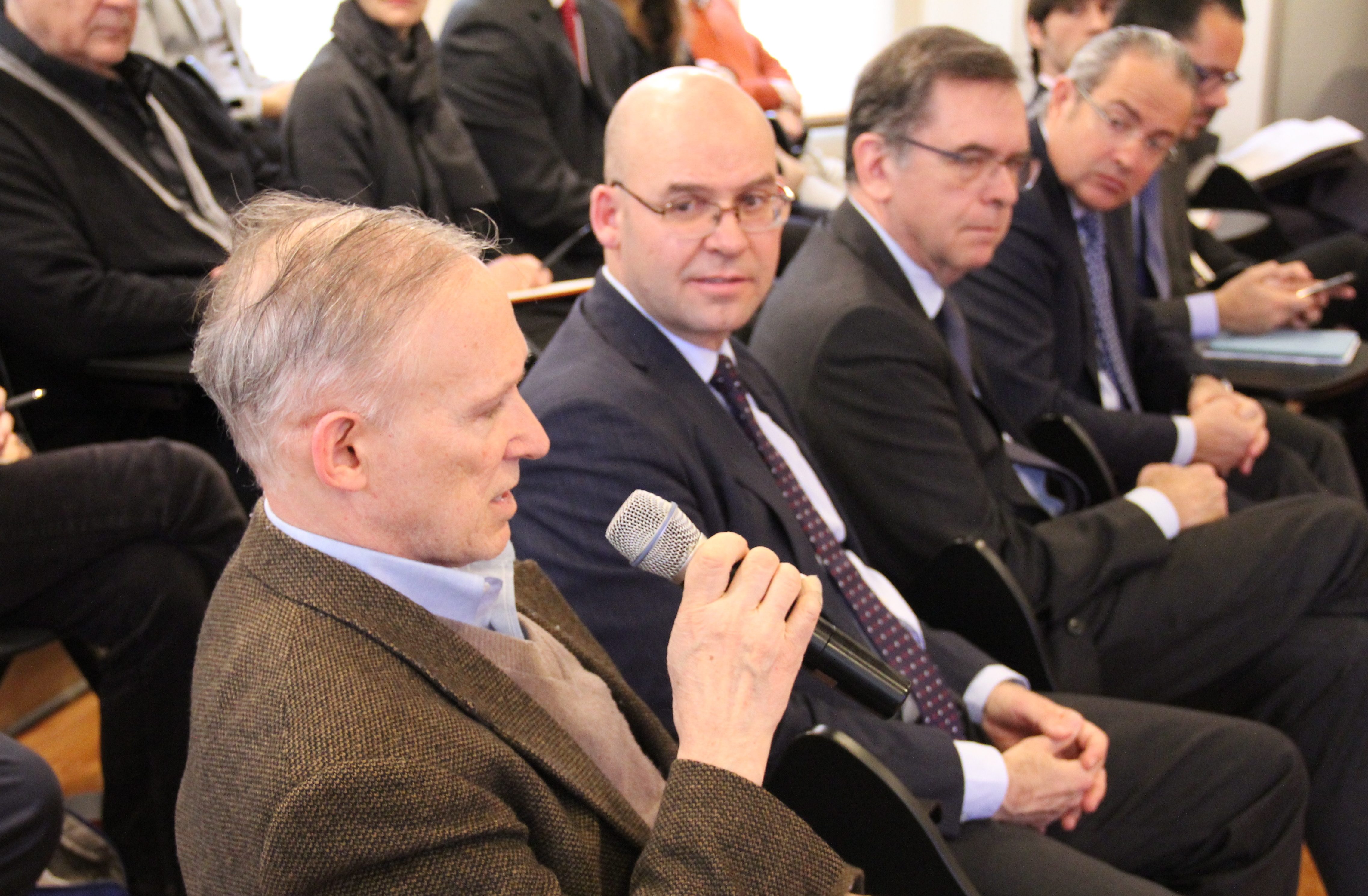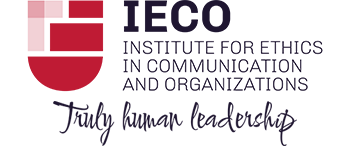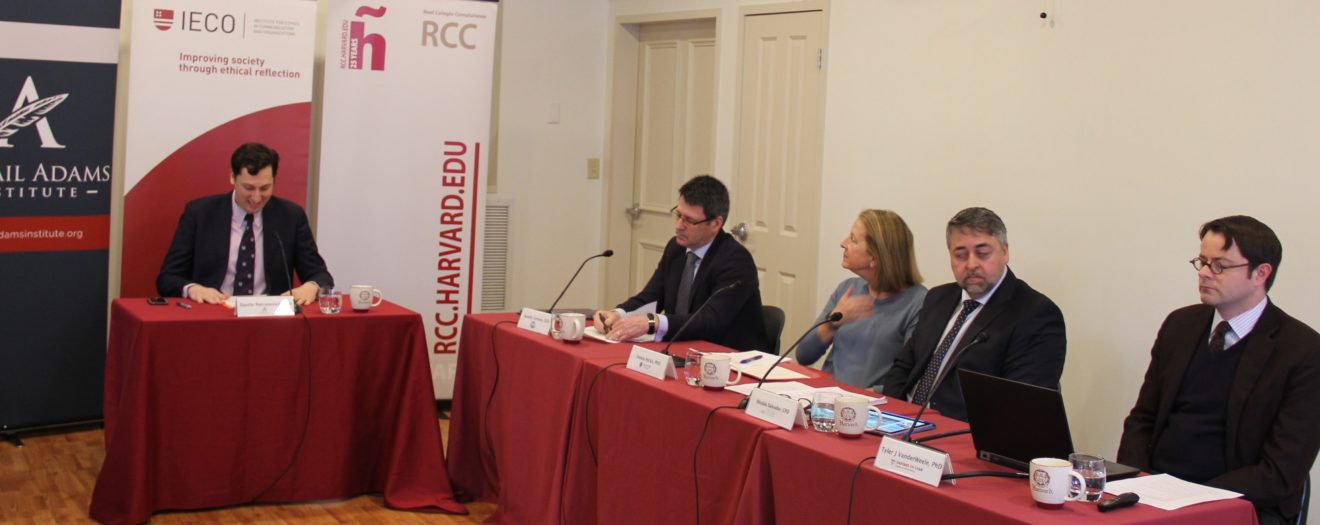IECO Institute proposes in its Sixth International Colloquium at Harvard whether intangibles as trust, flourishing and meaningful work, can contribute to humanize business in a practical way.
“Trust Based Management: practical ways of humanizing business” was the title of the Sixth Annual IECO-RCC International Colloquium at Harvard University that took place on March 22 and brought together around thirty academics and professionals from Boston, Texas, Washington and Chicago area.
This initiative was conceived five years ago by Professor Manuel Guillén, Founder and Director of IECO Institute and the IECO-UV Chair of Business Ethics. He is currently the Representative of the University of Valencia at the RCC-Harvard. Since 2016, the event has been co-organized and supported by the Abigail Adams Institute. This year’s edition has also been supported by two Valencian businessmen who sponsor the Chair: RNB and RGIB (Royo Group International Bathroom). The objective of these international Colloquiums is to promote interdisciplinary discussions on issues related to business ethics and trust in organizations.
Danilo Petranovich, Director of the Abigail Adams Institute was the moderator of this year’s edition and was attended by two academics from Harvard University, Tyler VanderWeele and Donna Hicks. Alejandro Cañadas, from IECO-UV Chair presented an online contribution from Maryland. As a novelty, this year’s Colloquium has involved two Valencian businessmen, Aurelio Tornero (CEO of RNB) and Nicolás Salvador (Financial Director of RGIB). In their interventions, full of examples and anecdotes, they have contributed the practical vision of their daily work on how to make their organizations more human environments that contribute, with small and large gestures, to favor the personal and professional development of their employees.
In his presentation, Tyler VanderWeele from the T.H. Chan School of Public Health of Harvard, focused on the research project developed in several multinationals. He proposed how to measure flourishing in the workplace, which defines the state of complete human well-being that is achieved when all aspects of a person’s life are good. He explained that, in order to measure such a broad and intangible concept, he has put in dialogue the disciplines of Psychology and Philosophy. As a result, it has established 5 domains that, because they are an end in themselves and universally desired, can be considered as contributing to complete human development: happiness and satisfaction in life; physical and mental health; meaning and purpose in life; virtue and character; and close social relations. His research has shown that measuring these parameters has relevance for organizations since flourishing contributes, among others, to increase the productivity of employees, the quality of their work, their personal satisfaction and their level of commitment to the company.
Donna Hicks, from the Weather head Center for International Affairs at Harvard University, defended a “positive” approach to building trust and flourishing workers in organizations from the perspective of dignity. He explained that honoring the dignity of others makes the connection with those around us easier and faster and is a way to make sense of our lives. In the workplace, it provides an excellent opportunity to exchange micro moments of positive resonance and love with others. He also showed that leading with dignity means connecting with the concept of security. Not in a physical sense, but security, for example, to tell superiors what is not going well. Managers who are experts in creating these moments of connection with their employees will build trust with their workers and contribute to their well-being and create a healthy culture within the organization. Not only will people develop, but at the same time, the organization will grow and prosper.
In a very practical and visual exposition, Aurelio Tornero, General Director of RNB explained what is the DNA or the “essence” of his organization, dedicated precisely to the development of essences (perfumes) and cosmetic products. In this Valencian company, one of the national leaders in its market, they firmly believe that each person in the organization has “the same dignity but different responsibility”. And this is something that does not only appear in the description of their values on the web, but also defines their organizational culture because they try to put it into practice on a day-to-day basis. This is the particular focus of business ethics that is lived in GNR through what they have called “the small things revolution”, where every little detail in daily work matters, and where it is demonstrated that there is a real concern for People and work well done.
Likewise, Nicolás Salvador, Financial Director of RGIB, one of the three leading firms in Europe in the bathroom furniture sector, spoke of the importance that human teams have for the organization. In RGIB they are convinced that if your team is good, you will be good and, if your team does not work well, you will have low performance. Just as any person individually is not essential or perfect, teams can be. The good example is essential to achieve that the company advances in all the senses and a sample of good practices in the company is what they denominate to foment the “positive rumor”. It consists of giving back to the rumor or gossip – something innate to people, of difficult control and with negative connotations – causing that small positive things are rumored that help to progress. Give voice to positive results and small achievements that generate trust and that make people feel really motivated and committed to the organization, being “drivers”, with initiative and providing value, and not mere “passengers”.
Finally, in his online intervention, Alejandro Cañadas, an IECO researcher and Professor of Economics at Mount St. Mary’s University (Maryland), reflected on the idea that there is an intrinsic goodness in companies that is manifested in their contribution to good. common, something increasingly demanded by society to companies, both public and private. It is what has been termed as “Human Ecology”, a social purpose or positive contribution to society that can be measured in terms of: the economic benefits it achieves, what it brings to the planet, the development of people and the ethical quality of the own organization. In addition, Professor Cañadas defended that it is possible to speak of a call in business leaders and workers to serve others and society. A kind of vocation that once discovered helps everyone to give their best in the workplace, favoring flourishing or complete human well-being at all levels.

All the interventions generated great interest among the attendees and gave rise to a lively dialogue at the end of the Colloquium between the speakers and the more than thirty academics and professionals from the Boston, Texas, Washington and Chicago area who were able to approach the RCC despite restrictions on transport by the snow storm that had been announced.
The colloquium, recorded by the audiovisual service of Harvard University, is available on the YouTube channel of this prestigious American University.
“Trust Based Management: practical ways of humanizing business”
It is also possible to access the videos of previous editions of the Colloquiums by clicking on the title of each edition:
- Educating millennials for ethical leadership and trust (2017)
- Building trust in organizations through meaningful work (2016)
- Developing trust and ethically healthy organizations through Humanistic Management (2015)
- The role of moral and spiritual motivation in building trust (2014)
- The role of ethics, values and dignity in building trust (2013)


